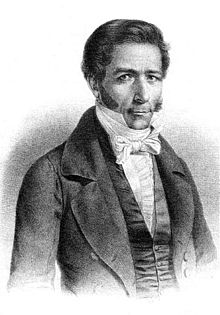José Gaspar Marín
José Gaspar Marín Esquivel (* 1772 in La Serena , Chile , † February 24, 1839 in Santiago de Chile ) was a Chilean lawyer and politician. He was secretary of the first government junta, which ruled Chile from September 1810 to July 1811, and a member of the second junta that José Miguel Carrera installed after his coup in the fall of 1811.
He was married to Luisa Recabarren y Aguirre, with whom he had five children.
Youth and education
Marín was born in La Serena as the son of José Fermín Marín y Aguirre and his wife Josefa del Carmen de Esquivel y Hernández Pizarro.
He studied theology and law at the Real Universidad de San Felipe and completed both subjects with a doctorate. Marín initially pursued a legal career, from 1809 he was president of the Bar Association ( Academia de Abogados ).
Member of the first government junta in 1810
With Napoleon's invasion of Spain, the imprisonment of King Ferdinand and the formation of the Junta Suprema Central , the urge to set up a junta also arose in Chile. On September 18, 1810, the governor of Chile, Mateo de Toro Zambrano y Ureta , called a meeting to deliberate on the government of the country.
At the assembly that marked the beginning of Chile's independence , a government junta was elected, chaired by Toro Zambrano. The junta appointed two secretaries, one of whom was Marín.
Member of the second junta in 1811 after the Carrera putsch
During the coup carried out by José Miguel Carrera in September 1811, the Congress, which had replaced the government junta, was supposed to be brought in a more independence-oriented direction. Marín was one of the radical MPs (for the constituency of Coquimbo ) who Carrera appointed to replace the deposed moderates and royalists.
After a second coup, Carrera dissolved the Congress in November 1811 and installed a triumvirate, which included Juan Martínez de Rozas and Marín as well as himself .
After independence
When the Spaniards regained power in Chile after the Battle of Rancagua in the fall of 1814, Marín went into exile in Mendoza, Argentina, like many other independence fighters (including Carrera and Bernardo O'Higgins ) . After the final victory of the independence movement in the wake of the Battle of Chacabuco in February 1817, he returned to Chile.
Marín went back to justice: in 1823 he became a prosecutor at the Chilean Supreme Court. At his death he acted as ministro of the Supreme Court.
He was elected several times as a deputy and senator in the Chilean Congress and was a member of the Judiciary Committee and, in 1832, Vice President of the Chamber of Deputies.
He died in Santiago in 1839 at the age of 67.
swell
- Ismael Espinosa: El Cabildo Abierto del 18 de septiember de 1810 near Aurora de Chile (Spanish)
- Biography in the library of the Chilean National Congress (Spanish)
| personal data | |
|---|---|
| SURNAME | Marín, José Gaspar |
| ALTERNATIVE NAMES | Marín Esquivel, José Gaspar |
| BRIEF DESCRIPTION | Chilean lawyer and politician |
| DATE OF BIRTH | 1772 |
| PLACE OF BIRTH | La Serena , Chile |
| DATE OF DEATH | February 24, 1839 |
| Place of death | Santiago de Chile , Chile |
